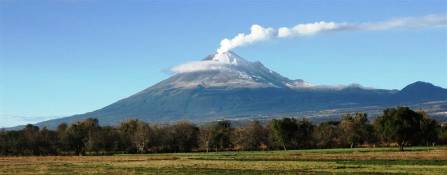In just over a week we fly out to Mexico to prepare for the arrival of Museum scientists Chiara Petrone and Dave Smith. We will be following them as they ascend the 2nd highest volcano in North America and the most active in Mexico, Popocatepetl.
Familiar with field work on active volcanoes such as Stromboli (Italy), Santorini (Greece), Vesuvius (Italy) and the Mexican Volcanic Arc, this is new territory for Chiara, whose aim is to collect samples to bring back to the Museum to study.
In early February, we'll be following Museum scientists as they perform their field work on Popocatepetl - the 2nd highest volcano in North America and the most active in Mexico. Image: Cvmontuy
Working alongside our scientists is Professor Hugo Delgado-Granados, a researcher from the National Autonomous University of Mexico (UNAM). The team are hoping to discover the entire history of the volcano from the rocks they collect, spending a working week hammering in the outcrops and climbing up to 5,000 metres, carrying rocks on their backs.
Reaching only a few hundred metres from it's very peak, the crater area is at present, too dangerous to climb to as 'Popo' is in an 'eruptive mood'. Let's hope this mood stays stable enough for us to climb and find specimens that will help them fully understand this incredible, natural phenomena.
Join the adventure and post up questions for the team on our blog posts, and come along to the Museum's Attenborough Studio where we'll live-video-link on the 5, 6 and 9 of Feb. Altenratively, kick back and watch us on a live-web-stream here. Whatever you do, do take part. We'd love the company as we scramble up a constantly erupting volcano with backpacks full of black rock.



